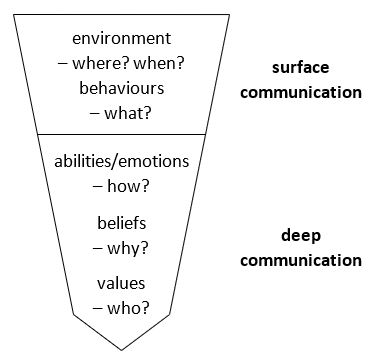Following fragment was taken from the chapter “Levels of Communication” from the upcoming book “DSR®: Mastering Communication”. Some parts can be slightly different in the final published version due to still ongoing works on the book. Enjoy your reading – and write to the Author at any time you want!
[…]
Robert Dilts developed the model of neurological levels, based on the research of Gregory Bateson. Bateson, while discussing the logical levels (the one named by Dilts: neurological levels) of the mind, developed the following thesis:
The higher logical level organizes the lower level.
This means that if there is a contradiction between the levels, the level which „wins” is the one higher in the hierarchy. A belief (ideology, worldview) always subjugates (and matches together) emotions (if you believe you will feel bad in a specific situation, then take a wild guess which feeling your subconsciousness will generate in your body right there and then). Your system of values (level of identity) is a filter which enables you to accept these or other beliefs.
When we talk about the – “What? Where? When?” In a conversation – it means it is a surface conversation. This is a typical transfer of information – “I was, and I did”. Deeper emotions should not be present here.
When we begin to show our emotions in the discussion, we enter the ability level. This is a simplified definition of the emotional level.
When we talk about beliefs, worldviews and opinions, we journey even further into the process of communication.
Whereas, when we talk about values, we communicate on the highest possible level. If you follow the Bateson principle and create a value-level bond, the other levels will adjust automatically.
Surface communication (picture 1.2) is communication at the level of information, observable facts. We can see how a person adapts and influences his or her environment; see how he or she behaves.


Picture 1.2. Levels of Rapport
Deep communication — means communicating on the level of information, which comes from the „interior” of a person. We gather this information through careful observations and speculations (sic! We can only guess what this person is really like „inside”), as well as based on what the other person tells us about themselves.
During a conversation, information is exchanged from a specific level, and we find out which ones are for both sides shared, then we create a feeling of connection on this level.
Simple similarity (picture 1.2) — occurs when we take over the same space; an example can be the same dressing style (your clothing is what the recipient can notice).
Similar behaviours — include your way of being, body posture, speed of talking, gesticulations (NLP has the term of mirroring behaviours).
Shared emotions — we encounter them when we share feeling with someone ( e.g. excitement) despite having different life experiences and memories (you get excited when skiing, while your recipient gets excited driving a motorboat).
Shared worldview — when we show the other person (through conversation), that we have a similar worldview on various matters – political, economic and religious preferences belong to this level.
Shared values —when we both have the same value (despite having different experiences).
This means that making the impression that we share values in a conversation, makes the other person identify with you very strongly. People call it „being soulmates” or feeling like they’d known each other their whole lives. Commonly, people call this „finding your other half”.
Talking about the environment and behaviours, even in the best case, will only create the impression of a surface similarity.
Talking about emotions and worldview (you should be careful here because people are sensitive to these topics) and values will allow you to create a deep contact feeling.
The main goal you want to reach during a conversation is to create a deep contact with them (good rapport – best by finding shared values; picture 1.3). The contact will turn into a feeling of deep connection (for example, by identifying some shared values after raising relevant topics during the conversation; picture 1.3).


Picture 1.3. Conditions required to build a sense of connection through conversation
Notice that such rapport is not a state that actually occurs between people. It’s the sense of connection that occurs separately in each person. It may be, that a significant disproportion regarding the depth of this sensation will occur between both sides. An example can be unrequited love.
During a conversation, it’s important to put attention not only to building deep understanding, but also to the first, second and third impression.





Where do I purchase an English version of your latest book?